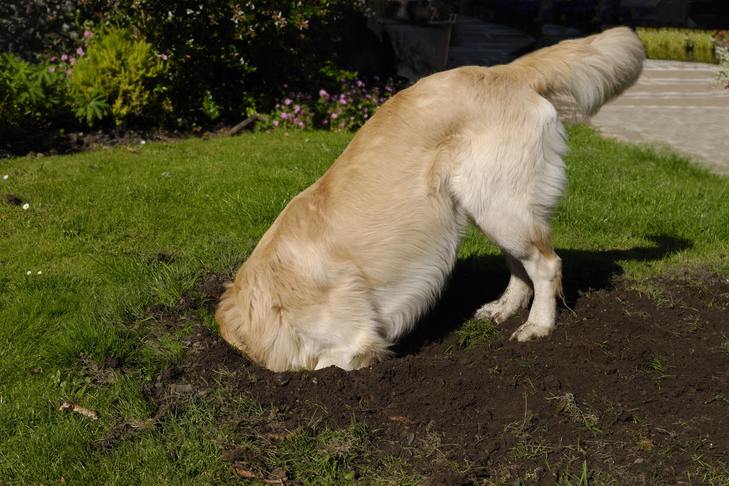Why Does My Dog Keep Digging?
Many dog owners have experienced the frustration of finding their beloved pets digging up their yards. It can be baffling and even exasperating to witness our furry friends tirelessly digging holes in the ground, leaving behind a mess of dirt and upturned plants. However, it is important to understand that digging is a natural behavior for dogs, rooted in their instincts and various underlying reasons. By delving into the motivations behind this behavior, we can gain insight into why our dogs engage in digging and how we can address it effectively.
Dogs have a rich history of digging, dating back to their ancestors, the wolves. Wolves would dig dens to create safe and comfortable spaces for themselves and their offspring. This instinctual behavior has been passed down through generations, and although domesticated dogs may not have the same need for dens, they still retain the innate inclination to dig.

There are several reasons why your dog may be digging. One common motivation is seeking entertainment and mental stimulation. Dogs are intelligent creatures that require mental and physical exercise to stay happy and healthy. When left alone for extended periods without appropriate outlets for their energy, they may resort to digging as a way to alleviate boredom and expend excess energy.
Another possible reason for digging is the pursuit of prey. Dogs have a keen sense of smell and are naturally inclined to chase small animals like rodents or insects. If your dog detects the presence of these creatures in your yard, they may dig in an attempt to uncover them. This behavior is particularly common in breeds with a strong prey drive, such as terriers.
Furthermore, digging can be a result of environmental factors such as temperature regulation. Dogs may dig holes to find cooler spots in hot weather or create warm nests in colder climates. By digging, they are able to adjust their body temperature and seek comfort.
Lastly, anxiety and stress can also trigger digging behavior in dogs. Just like humans, dogs can experience anxiety due to various factors such as separation anxiety, fear, or changes in their environment. Digging may serve as a coping mechanism for them, providing a sense of control and comfort in stressful situations.
Understanding the reasons behind your dog’s digging behavior is crucial in order to address it effectively. In the following sections, we will explore practical recommendations and strategies to help redirect your dog’s digging instincts and promote more desirable behaviors.
Understanding the Reasons Behind Your Dog’s Digging Behavior
Have you ever wondered why your dog keeps digging up your yard? It can be frustrating to see your once pristine lawn transformed into a series of holes and mounds of dirt. However, before you get too upset, it’s important to understand that digging is a natural behavior for dogs and can be attributed to a variety of reasons.
1. Instinctual Behavior
Dogs have a long history of digging, rooted in their ancestral instincts. In the wild, wolves would dig dens as a safe and comfortable space for themselves and their young. This instinctual behavior has been passed down to domesticated dogs, even though they may not have the same need for dens. Digging can be seen as a way for dogs to create a cozy spot or establish their territory.
2. Boredom and Excess Energy
Dogs are intelligent creatures that require mental and physical stimulation to stay happy and content. When left alone for long periods without appropriate outlets for their energy, they may resort to digging as a form of entertainment. Digging provides them with a physical activity that engages their muscles and allows them to release pent-up energy. If your dog is digging excessively, it may be a sign that they are not getting enough exercise or mental stimulation.
3. Prey Drive
Another common reason for digging is a dog’s natural prey drive. Dogs have a keen sense of smell and are instinctively inclined to chase small animals like rodents or insects. If your dog detects the presence of these creatures in your yard, they may dig in an attempt to uncover them. This behavior is particularly common in breeds with a strong prey drive, such as terriers. It’s important to note that trying to completely eliminate a dog’s prey drive may be challenging, but redirecting it in a positive way can help manage their digging tendencies.
4. Temperature Regulation
Dogs may also dig holes as a way to regulate their body temperature. In hot weather, they may dig to find cooler spots in the ground. Conversely, in colder climates, they may dig to create warm nests. By adjusting their body temperature, dogs can seek comfort and find relief from extreme weather conditions. Providing alternative ways for your dog to cool down or stay warm, such as providing shade or a cozy shelter, may help reduce their digging behavior.
5. Anxiety and Stress
Just like humans, dogs can experience anxiety and stress. Various factors, such as separation anxiety, fear, or changes in their environment, can trigger these emotions. Digging may serve as a coping mechanism for dogs, providing them with a sense of control and comfort in stressful situations. If you notice that your dog starts digging more frequently during times of stress, it’s important to address the underlying cause of their anxiety and provide them with the necessary support and reassurance.

Practical Recommendations to Address Your Dog’s Digging Behavior
1. Provide Sufficient Exercise and Mental Stimulation
One of the most effective ways to curb your dog’s digging behavior is to ensure they receive enough exercise and mental stimulation. Dogs that are tired and mentally engaged are less likely to resort to digging out of boredom or excess energy. Take your dog for regular walks, engage in interactive play sessions, and provide them with puzzle toys or treat-dispensing toys that require mental effort to access the rewards. A tired and mentally stimulated dog is a happy and content dog.
2. Designate a Digging Area
Consider creating a designated digging area in your yard where your dog is allowed to dig freely. This can be a specific section of your garden or a sandbox filled with loose soil. Encourage your dog to dig in this designated spot by burying toys or treats for them to discover. By providing an appropriate outlet for their digging instincts, you can redirect their behavior away from your prized flower beds or vegetable patches.
3. Provide Environmental Enrichment
Enriching your dog’s environment is crucial to keep them mentally stimulated and engaged, which can help address the question, “Why does my dog keep digging?” Create an outdoor play area with obstacles, tunnels, or digging pits filled with toys and hidden treats to tackle the issue of “Why does my dog keep digging?” This setup not only entertains them but directly responds to the concern, “Why does my dog keep digging?” by providing an appropriate outlet for their digging behavior.
Rotating and introducing new toys regularly is essential to prevent boredom and can be a solution to the problem, “Why does my dog keep digging?” By keeping your dog’s environment dynamic and engaging, you’re less likely to find yourself pondering, “Why does my dog keep digging?” as they find satisfaction and mental stimulation through the variety of toys and activities you provide.
Additionally, consider providing interactive feeding toys that require your dog to work for their food, such as puzzle feeders or Kong toys stuffed with treats. This strategy not only addresses the concern of “Why does my dog keep digging?” by keeping your dog mentally stimulated but also redirects their energy towards productive activities. Implementing these changes can significantly decrease the frequency of asking yourself, “Why does my dog keep digging?” as your dog becomes more engaged and less likely to resort to digging out of boredom.
4. Address Anxiety and Stress
If your dog’s digging behavior is driven by anxiety or stress, it’s important to address the underlying cause. Identify triggers that may be causing your dog’s anxiety, such as loud noises, separation, or changes in routine. Provide a safe and comfortable space for your dog to retreat to during stressful situations, such as a crate or a designated relaxation area. Consider using calming aids, such as pheromone diffusers or anxiety wraps, and consult with a veterinarian or professional dog behaviorist for additional guidance and support.
5. Supervise and Redirect
Supervise your dog when they are outside to prevent unsupervised digging, a common concern for many pet owners who find themselves asking, “Why does my dog keep digging?” If you catch your dog in the act of digging in an undesirable area, it’s crucial to understand the underlying question: “Why does my dog keep digging?”
Redirect their attention to a more appropriate activity or area, as this addresses the root of “Why does my dog keep digging?” Use positive reinforcement techniques, such as treats or praise, to reward your dog when they engage in desired behaviors. This approach not only helps in managing the issue of “Why does my dog keep digging?” but also promotes a positive relationship between you and your pet.
When trying to discourage unwanted digging habits, remember the importance of consistency and patience. Each time you redirect your dog from digging in an undesirable area, you’re providing an answer to the question, “Why does my dog keep digging?” by reinforcing positive behaviors. Creating a designated digging area can be an effective strategy, offering a direct solution to “Why does my dog keep digging?” Rewarding your dog for using this area or playing with their toys instead of digging elsewhere is crucial.
In essence, consistently applying these strategies and understanding the underlying reasons behind the question, “Why does my dog keep digging?” can greatly reduce unwanted digging behaviors. It’s about acknowledging their natural instincts while guiding them towards more acceptable outlets, thus addressing the core of “Why does my dog keep digging?”

6. Seek Professional Help if Needed
If you find yourself constantly questioning, “Why does my dog keep digging?” and your dog’s digging behavior persists or becomes destructive despite your efforts, it may be beneficial to seek professional help. A professional dog trainer or behaviorist can assess your dog’s specific needs and provide personalized guidance and training techniques to address the issue effectively, helping you understand the root of the question, “Why does my dog keep digging?”
Our featured products:
They can help you develop a customized plan to modify your dog’s behavior, directly addressing your concerns about why your dog keeps digging, and provide ongoing support throughout the training process. Their expertise can be invaluable in solving the puzzle of “Why does my dog keep digging?” and transforming this behavior into a more positive outlet for your dog’s energy.
Conclusion
In conclusion, understanding the reasons behind your dog’s digging habits is crucial for addressing this behavior effectively. For an in-depth exploration of “Why Does My Dog Keep Digging,” visit geepets.com, where you’ll find comprehensive guides and tips to help manage your furry friend’s digging instincts. Additionally, for more external resources and expert advice on dog behavior, the American Kennel Club (AKC) website (akc.org) offers a wealth of information on why dogs dig and how to curb this behavior. Both these resources can provide you with valuable insights and strategies to ensure your dog is happy, healthy, and well-behaved.















